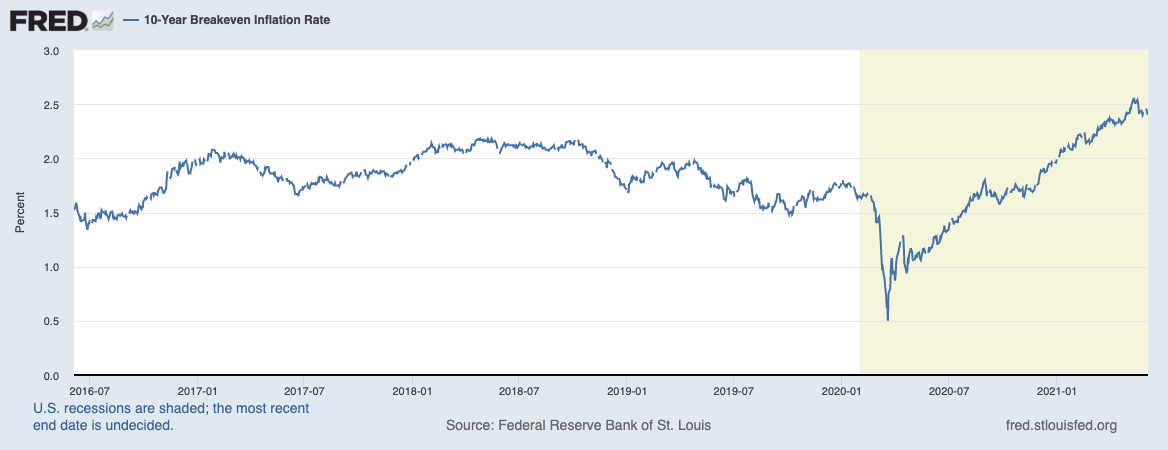6 Minute Read
It’s been a long time … a very long time … since inflation was on anyone’s radar. But, suddenly, rising prices are a genuine concern for investors again.
The good news: Asset classes such as real estate, and specifically multifamily, could still serve as an effective hedge against it.
Inflation? Really?
If you weren’t thinking about inflation heading into this decade, you’re probably not alone. Inflation hasn’t been a real force in the U.S. economy since the 1970s.
But inflation concerns are back on investors minds and with good reason. In March, inflation was identified as the biggest tail risk fund managers see to markets, replacing the pandemic as their greatest concern.¹ A sharp rise in the 10-year breakeven inflation rate also reflects growing inflation expectations. (See chart below.)
Investors may be right to worry. In April, the consumer price index jumped 4.2% from a year earlier, its biggest 12-month price surge since 2008.

For those worried about inflation, the line of thinking is roughly this: The Biden administration is providing $1.9 trillion in stimulus to U.S. households and businesses, with another $3 trillion in infrastructure spending potentially on the way. Those efforts come in the wake of huge sums of stimulus before Biden took office.
All of that stimulus, combined with pent up savings from many consumers during the pandemic, could unleash itself as vaccinations increase and COVID fears ebb. Corporations could respond to this surging demand with higher prices. Meanwhile, the Federal Reserve has indicated it is not inclined to reverse easy money policies as the economy recovers.
If these forces are strong enough to brew inflation, real estate may be the tonic investors need to hedge against it.
Multifamily Real Estate: A Natural Inflation Hedge
Traditionally, real estate has been a good hedge against inflation. Simply put, as inflation rises, so too, do property values and rental prices. Meanwhile, the loan one uses to purchase a property depreciates in value. Think of it this way: If your mortgage payment is $1,000 a month for 30 years, that $1,000 will seem like a lot less in say, 15 years, when your both your income and other non-fixed costs have kept rising.
But while most real estate investments have been viewed as good inflation hedges, perhaps no other sector offers more inflation protection than the multifamily space numerous reasons. First, housing is a necessity. All things being equal, if prices for most goods are rising, consumers who reside in a rental property will continue to carve out an increasing part of their budget for monthly rent because housing is a basic requirement.
Another reason multifamily is one of the best real estate sectors for inflation protection is that housing leases tend to be shorter than other commercial real estate leases. This means landlords can continually renew leases at higher prices to keep up with inflation.
Finally, inflation has a self-reinforcing effect that increases multifamily demand. As inflation increases and home prices rise, buying a home become prohibitively expensive, making more consumers renters by necessity, and increasing multifamily demand.
Already, the multifamily sector is showing early signs it can adjust to an inflationary environment. CoStar, a commercial real estate data and analytics company, said multifamily rent was up 1.7% in the first quarter. The company is estimating a 9% increase for the year in the U.S.
The Market Matters
At Forum, we believe we can make the value proposition of multifamily real estate even stronger by using our expertise to focus on the right market segments, in the right geographies and at the most favorable time By finding niche submarkets where supply/demand dynamics are most favorable, pricing power for multifamily real estate becomes even stronger.
Currently, our investments and developments follow two main trends. First, we are focused heavily on suburban markets. The pandemic and work-from-home environment has caused families and individuals to prioritize having more living space and outdoor space, driving people out of more expensive urban cores. As companies continue to be more flexible about work-from-home arrangements, we believe demand in suburban markets of growing cities should remain strong.
Second, we continue to focus on the “missing middle” market segment. We define this segment as the population of renters who earn too much to qualify for government subsidized, low-income properties, but who also do not have the significant cash down payment required to purchase a house in a sellers market.
The ranks of the missing middle are growing. Delayed household formation, rising home prices and a lack of wage growth for many middle market Americans have put more people into this market segment.Yet from a supply side, the missing middle continues to be underserved, as many developers focus instead on either the higher revenues associated with luxury rental properties, or the lower end of the market, with incentives associated with government assisted housing.
As supply/demand trends remain firm for this market segment, particularly in suburban locales, we believe multifamily rental income will continue to outpace inflation. In the current economic climate, this may be particularly relevant. These conditions provide incredible tailwinds to Forum on the Development, Acquisition, Debt and Credit sides of multifamily transactions.
Dave Kasprzak, Senior Managing Director - Forum Capital Advisors, LLC
dkasprzak@forumcapadvisors.com
Forum Investment Group, a Glendale, Colorado-based real estate investment firm with a focus on multifamily living – develops owns, operates and manages properties across the United States.




Leave Comment